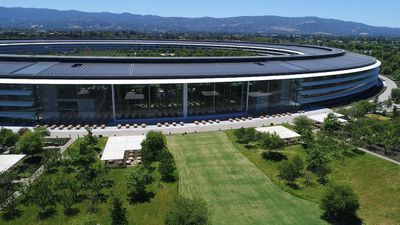Apple has made it clear that most of its employees will not be able to work remotely on a permanent basis, but that isn't stopping some corporate staff from continuing to push for more relaxed remote working rules, reports Recode.

In a new petition that went out this week, employees are asking Apple to allow employees to work from home on a more permanent basis. Apple has agreed to a hybrid work schedule that will require employees to come into the office on Mondays, Tuesdays, and Thursdays, with the option of working remotely on Wednesdays and Fridays.
Some employees are not happy with this arrangement because it requires that they continue to live in the areas near Apple's campuses, which are expensive. Housing prices in Cupertino where Apple's two main campuses are located start at over $1 million.
In June, employees sent a letter to Apple CEO Tim Cook asking for a more flexible approach, which prompted a reply from Apple's VP of people, Deirdre O'Brien. She said that in-person collaboration is "essential" to Apple's culture and future.
The second letter going around this week suggests two "pilot arrangements" that would give employees an opportunity to work remotely for at least one year. Under the proposal, employees would be able to work remotely five days a week with the approval of their manager or department head, and in some cases, with a cost-of-living compensation adjustment. The letter also complains that it is too early to return to the office, with the full text available below.
Dear Tim, Deirdre, and Team,
Thank you for all the work you and the team do to keep Apple's culture so rich, vibrant, and inclusive! We especially appreciate the People's team's efforts over the last few weeks to understand our personal situations. However, it has been disappointing to see these personal stories not acknowledged individually or by any change in policy. We continue to be concerned that this one-size-fits-all solution is causing many of our colleagues to question their future at Apple. Around 68% of the respondents to our informal survey somewhat or strongly agreed that the lack of location flexibility would likely cause them to leave Apple; that's over 1100 members of our Apple family, and we care about every single one of them.
With COVID-19 numbers rising again around the world, vaccines proving less effective against the Delta variant, and the long-term effects of infection not well understood, it is too early to force those with concerns to come back to the office. Furthermore, allowing some greater flexibility than the current 3/2 schedule would enable us to truly validate whether some people working remotely, not just everyone occasionally working from home, is compatible with Apple's culture of collaboration.
We propose the following adaptations to the Flexible Work Arrangement (FWA) and Temporary Remote Work Arrangement (TRWA) programs to make them part of the Hybrid Working Pilot. These new arrangements would be limited to one year with no promise to be extended.
Local WFH Temporary Pilot Agreement:
This proposal is intended to accommodate employees who work better from home--or who do not feel comfortable in the office while the pandemic is still not under control--by allowing them to continue working from home unless the particular needs of their role require them to be in the office.
- Required: Approval of direct manager.
- Default work location is home, but the employee will still have an assigned desk in the office.
- WFH location must be within commutable distance to the employer's assigned office.
- A fixed WFH/in-office schedule may be part of this arrangement at the manager's discretion.
Remote WFH Temporary Pilot Agreement
This proposal is intended to accommodate employees whose living situations are not compatible, or have become incompatible, with commuting to an Apple office
- Required: Approval of department head.
- Default work location is current permanent home address; employee will not have an assigned desk in the office.
- Employee's compensation may be adjusted based on location, the same as for permanent remote employees.
We believe that these two proposals are essential to making the Hybrid Working Pilot successful. Together, they ensure the Pilot encompasses the full range of office and non-office working arrangements, allow us to retain many of our colleagues, who have expressed the desire for location-flexibility in their current roles, and enable individuals and teams to respond more quickly to the changing regional conditions of COVID-19 without relying on previous company-wide guidance. We hope you agree that the risks of these adapted policies are minimal while their potential benefits are enormous and look forward to hearing your thoughts.
Apple employees maintain a Slack channel with more than 6,000 members where they have been discussing Apple's remote work policies and where the two petitions have been drafted from. Last week, employees complained to The Verge that Apple has been cracking down on remote work policies and approving fewer remote work requests following the hybrid model announcement.
Approximately 10 people from the Slack channel have claimed they are planning to quit if forced to return from the office, and it's likely that number is larger as not all employees participate in the channel.
Many tech companies in the Bay Area where Apple is located have gone fully remote or are offering more expansive work from home options for their employees. Google and Facebook, for example, are letting some employees work remotely on a permanent basis.
In Santa Clara County where Apple's Apple Park and Infinite Loop campuses are located, there is once again a mask recommendation, which is not yet a mandate. Employees are correct that Delta variant cases are ramping up in California, which does have the potential to impact Apple's September return plans.























